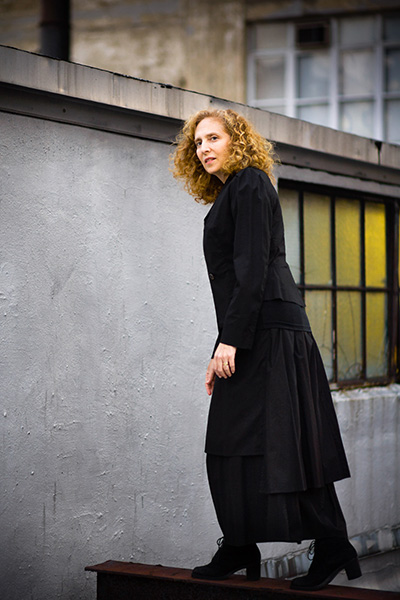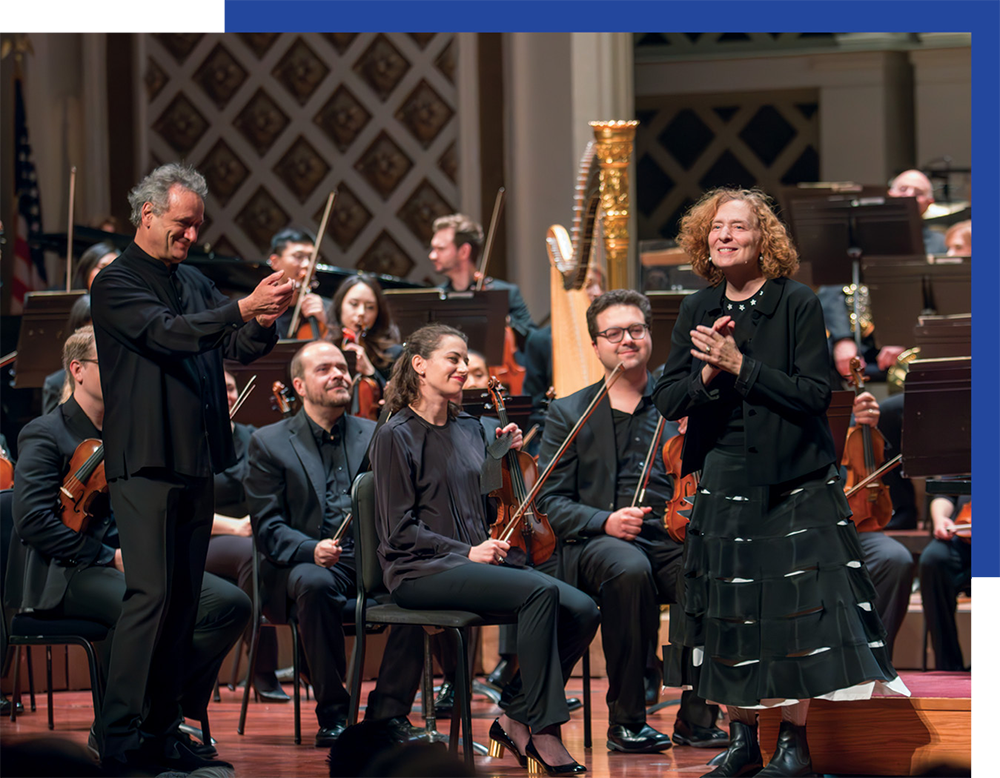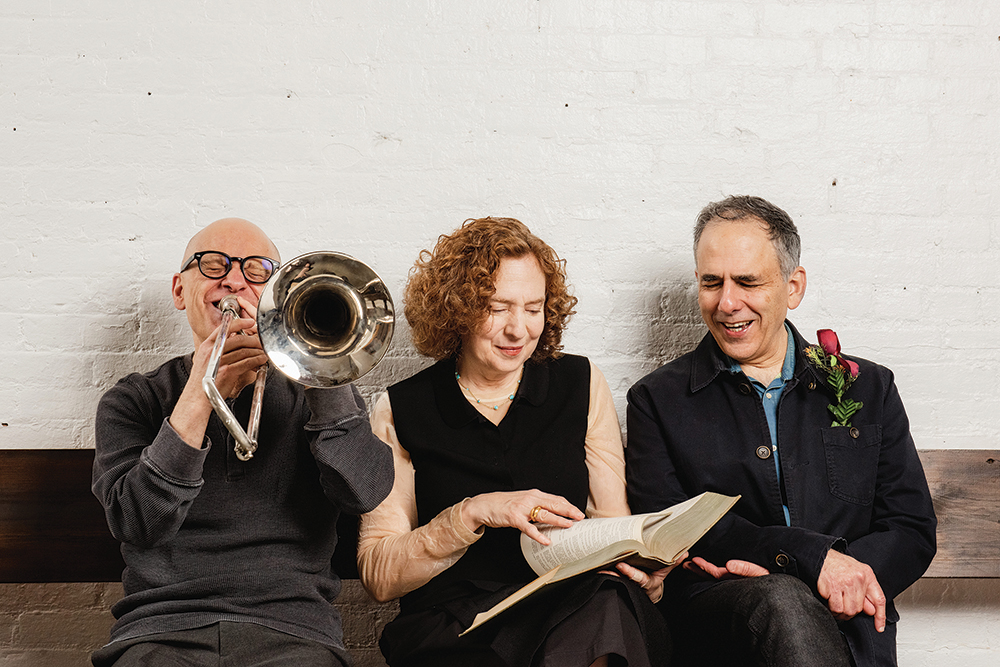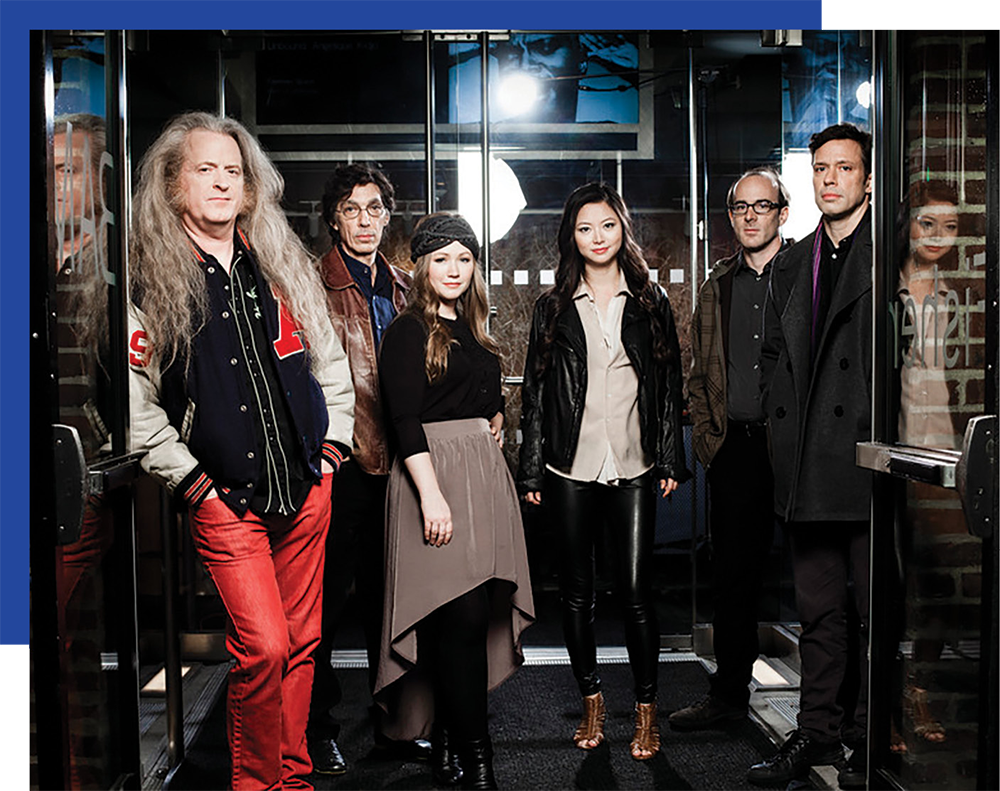Julia Wolfe Wants to Tell You a Story
A love of folk music and theater courses through the work of the Pennsylvania-born composer. Discover why she was a natural choice to become the May Festival’s Inaugural Festival Director.
by Hannah Edgar

Earlier this season, the Berlin Philharmonic performed Julia Wolfe’s Pretty, a 20-minute orchestral essay. But Wolfe’s piece dons orchestral effects that are more hard-rocking than “pretty”: scratching cellos, a rowdy drum kit, and vibrato like a shrieking Stratocaster.
Musicians in that storied ensemble could scarcely contain their delight during the performance. Neither could Wolfe.
“I feel like it’s very much an American sensibility in terms of rock ‘n’ roll—but they got it. It was a blast,” she says.
If someone is to take an august institution like the May Festival—which predates the Berlin Philharmonic by nearly a decade—and give it a similarly energizing shake, Wolfe is the one to do it. Wolfe, 65, is among the most sought-after and original choral-orchestral composers working today, most widely known for her affiliation with Bang on a Can, the New York-based musical collective she co-founded with fellow composers Michael Gordon and David Lang.
Wolfe, Gordon and Lang were considered enfants terribles when they hosted the first Bang on a Can marathon concert in a SoHo loft, in 1987. These days, Bang on a Can is an institution unto itself, with a critically acclaimed ensemble (the Bang on a Can All-Stars), formidable commissioning clout, trademark marathon musical events and its own summer festival. But even with a Pulitzer Prize, a MacArthur “genius” grant and a recent appointment as a Guggenheim Fellow under her belt, Wolfe still sees herself as the same scrappy, hungry composer she was nearly 40 years ago. Amazingly, Fountain of Youth, a piece the Cincinnati Symphony Orchestra (CSO) co-commissioned in 2019, was one of her first major orchestral commissions. Pretty, which the Orchestra will perform at the May Festival on May 18, followed it four years later.

“When somebody calls me to do something in a world I haven’t lived in my whole life, it’s always a surprise,” she admits. “Other people would look at me and say, ‘You’re an insider at this point,’ but I never feel like I am. I always feel like I’m coming in from some outside route, somehow.”
Wolfe grew up in Montgomeryville, a small suburb of Philadelphia. Her parents were “liberal-minded,” she says, but not particularly politically engaged. A young, feminist firebrand, Wolfe was, in her words, the family’s “odd bird.” She attended the University of Michigan, attracted by its alternative, artsy Residential College—a small liberal arts program ensconced in the larger state school.
“I went out there with my mom on a tour, and I wasn’t really relating to the tour guide. She was a cheerleader, or something—it’s a big football school. At a certain point, somebody on the tour asked, ‘What about that Residential College?’ And she was like, ‘Oh, no, you don’t want to go there’... I just looked at my mom and said, ‘We have to go see that,’” Wolfe remembers.
The vibrant music community around the university was also a huge draw. Then and now, major folk acts passed through the Ark, a storied Ann Arbor venue; harmonica player Peter “Madcat” Ruth and bones player Percy Danforth were local legends. Bars bounced to disco, and Wolfe waited tables at The Del Rio, a now-defunct jazz bar. Joni Mitchell, Bob Dylan and British folk group Pentangle were her heroes.
Wolfe didn’t intend to major in music—she was more interested in political history, or another subject in the social sciences aligned with her do-gooder idealism. A “Creative Musicianship” class her sophomore year inspired her to change course. Just after graduation, on an invitation from a former instructor, she started Wild Swan Theater, a small, woman-run company in Ann Arbor. (Wild Swan closed in 2021.) The company’s sensibilities were always multidisciplinary: the productions featured puppetry and music, again with an emphasis on folk traditions.
But music gradually became Wolfe’s life. She left the company in 1984 to study composition at Yale University, where she met Gordon and Lang. But her life in the theater was lodged in her bones. When she began exploring the oratorio genre in the 2000s, after decades of working almost exclusively in instrumental music, it felt like a homecoming.
“That experience of being in the theater totally changed me. It’s in the music,” she says.
Wolfe’s first oratorio was Steel Hammer, in 2009, for three sopranos and a chamber ensemble (originally the Bang on a Can All-Stars). The hour-long piece adapts folk tales about African-American steel driver John Henry, who, according to legend, once raced a steam-powered rock drill and won. (The piece became a Pulitzer finalist in 2010.) Wolfe’s unEarth is a 2023 New York Philharmonic commission about climate change. Parts of the text were devised by conversations with the Young People’s Chorus of New York, who also premiered the piece.
NPR once christened these recent opuses “docu-torios”—a label Wolfe has embraced.
“It’s great, because I don’t really know what to call these pieces. I mean, oratorio fits: it’s addressing a subject, and while there could be characters, they’re definitely not singing to each other like they would in opera. It’s more a sort of storytelling. ‘Docu-torio’ combines the narrative part, and the history part,” she says.
The May Festival programs two of those “docu-torios”: Anthracite Fields, her Pulitzer Prize-winning tribute to Pennsylvania coal miners (May 23), and Her Story, about the history of women’s suffrage (May 25). Her Story’s score directs singers to make coordinated, semi-theatrical motions, which Wolfe says were inspired by that course-changing University of Michigan class: the professor, a singer, used hand motions to “direct the voice.”

In its review of Her Story’s 2022 premiere in Tennessee, the state that cast the final vote to ratify the 19th Amendment, the New York Times observed that Her Story “sobers as much as it rouses.”
“It has a ferocity that is literally written into the score, but also an absence of resolution as it looks back to suffrage with one wary eye toward the future steps this country still needs to take for something resembling true equality,” wrote critic Joshua Barone.
Mary Stucky, May Festival Board member and a voice professor emerita at the University of Cincinnati College-Conservatory of Music, says Wolfe’s music strikes powerfully at the essence of the oratorio genre.
“The oratorio, as it was envisioned, tells a religious or ethical story,” Stucky says. “The ethical part of that continues in Julia’s music.”
Anthracite Fields will take on still-greater significance here. Cincinnati is among the cities that saw a midcentury influx of Appalachian migrants, many of whom toiled in the region’s coal mines. Wolfe says she’s been approached by descendants of coal miners in performances of the piece from Philadelphia to Los Angeles. One concertgoer was even related to one of the “Johns” named in the oratorio’s opening movement, which Wolfe sourced from a real-life index of mining accidents.
Wolfe grew up just outside Pennsylvania’s mining country. Even so, she considers Anthracite Fields “the most personal” thing she’s written.
“People are still living who are in some way connected to it,” Wolfe says.
This year’s Festival adds to Wolfe’s capacious catalog with All that breathes, a commission for the May Festival Chorus. While writing unEarth, Wolfe found herself returning to a section of the libretto inspired by the Ark in the book of Genesis: “All the creeping things, all the birds, all the animals, all the beasts, all of human life, all that breathes.” All that breathes is a fantasia on that single line, teasing it out syllable by syllable. Before Wolfe knew it, what began as a six-minute work more than doubled in length.
All that breathes is one of “just a few” a cappella works in her output. With 135 singers in the May Festival Chorus, it certainly features the largest vocal forces she’s written for to date. She’s found the challenge exhilarating.
“There are some syllabic patterns, some murmuring patterns, some breathing—I mean, it’s called All that breathes!” she says. “It’s fun to play with the voice in ways I hadn’t. Will it work, with a lot of people singing? Will it be something that becomes part of my language, or not? I don’t know.”
Wolfe is mulling over incorporating movement into All that breathes, like Her Story, though she’s still undecided.
“It’s a little hard to coordinate that with a hundred people,” she says, with a chuckle.
Thanks to Wolfe’s many musical connections, the entire Festival will be as crowded with talent as the chorus risers—many new to Cincinnati audiences. In addition to the usual combined forces of the CSO and May Festival Choruses, the Festival will host the Bang on a Can All-Stars, Bang on a Can’s amplified house ensemble; the Lorelei Ensemble, the treble choir who debuted Her Story in 2022; and the Steiger Butte Drum and Singers, Oregon-based Klamath tribe musicians with whom Gordon collaborated in his piece Natural History, heard on the May 23 program. Lang’s music is also featured on the Festival: his the national anthems is featured on the same program as All that breathes.
Forty years, scores of world premieres, and one marriage later (Wolfe and Gordon), Bang on a Can is still going strong. So, what’s the secret to keeping a good thing going?
“I wish I knew the exact answer,” Wolfe says. “I feel fortunate that they [Gordon and Lang] are great people—it’s a real friendship. And we all love music: the passion for the art is really strong. It lights a fire under my own work.”
